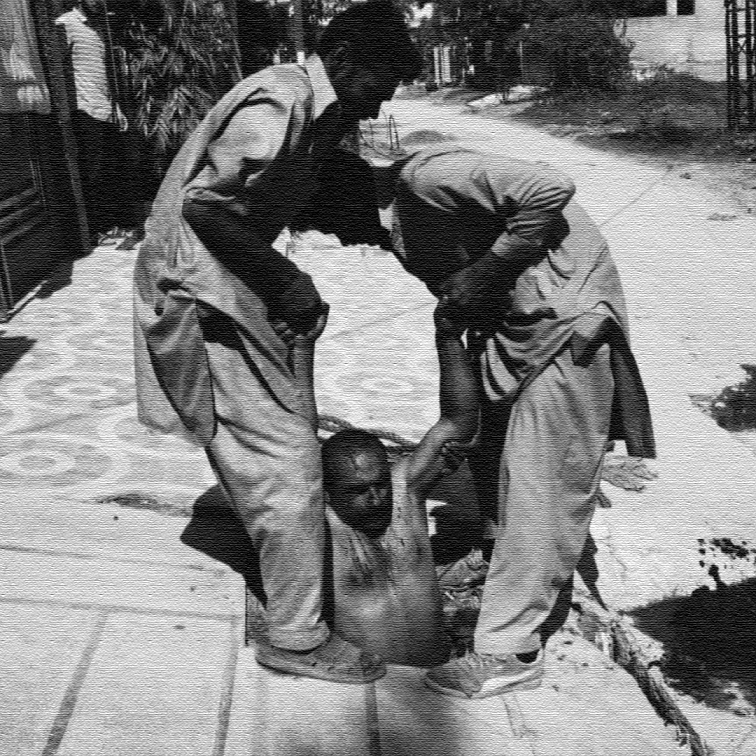Thirty-eight-year-old Maryam lives in tehsil Chak Jhumra of district Faisalabad. She is a single mother who is raising her four children on her own after the sudden demise of her husband. On the morning of July 15, her husband, Shakeel Masih, left for job, saying that he would buy groceries on his way back home.
“The children were starving and I was waiting for my husband. I thought that I would cook something good for the children that day as he had got work after a long time. However, later, I got the news of his death caused by the poisonous gas in the manhole,” says Maryam while speaking to Lok Sujag.
Since the accident, she has been working at different houses to support herself and her children.
Whether in large cities or small ones, a modern lifestyle requires an efficient sewer system. However, in Pakistan, the cleaning of sewage drains and sewer lines is still largely performed by sanitation workers without adequate safety measures and protection.
Appalling number of deaths every year
A report by the Citizens Commission for Equality and Human Rights, a non-government organisation working for the rights of sanitary workers, states that in Pakistan, approximately 100 sanitary workers are killed annually in manhole mishaps.
According to this report, around 24 workers died in the first six months of this year, of which eight were from Faisalabad. There were two more incidents in the city in July that killed three workers, taking the toll to 11 so far.
“Due to lack of proper safety measures, four workers were killed in Karachi and Lahore, three each in Tando Muhammad Khan, Hyderabad and Sargodha and one in Muzaffargarh during the first half of the ongoing year,” it says.
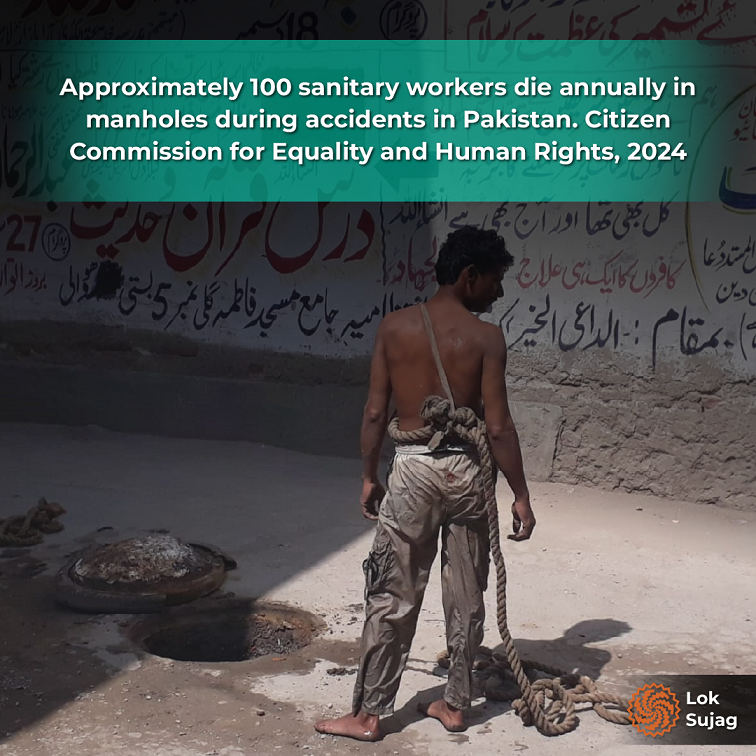
Water and Sanitation Authority (Wasa) Faisalabad spokesperson Qadir Sikandar claims that they provide ropes, safety harnesses, gas masks and pipes to the staff for cleaning the sewer lines. Moreover, two to three officials are available at the spot to provide emergency aid to the workers who climb down into the manholes.
“Wherever sewer line cleaning is required, the area supervisor is provided with the necessary safety gadgets from the relevant sub-division according to established procedures. It is the supervisor’s responsibility to ensure the workers safety and the proper use of protective equipment during the work.”
Sikandar says a departmental inquiry is conducted in case of any accident during the cleaning of sewer lines to prevent such cases in the future. However, he could not present any inquiry report on the past sewer line calamities or documentary evidence of recommendations for their prevention.
The Wasa spokesperson further claims that private housing schemes and other institutions have also been instructed to not only get their sanitation staff trained from Wasa and Rescue 1122 but also ensure that they are provided with safety equipment.
Call for ban on manual cleaning of sewers
However, speaking to Lok Sujag, Mian Muhammad Maqsood, the president of Wasa employees' union, Jamhoori Workers Union, looks dissatisfied with the quality of safety equipment and sanitation training. He says gas masks and oxygen cylinders are the main gadgets for sewer workers but they are not available in the department.
“Instead of a gas mask, they get a common mask attached to a 20-foot long pipe, which starts suffocating the worker who descends into the manhole wearing it.”
Maqsood says that in a meeting with the Wasa MD, he had demanded the oxygen cylinder facility for the workers as well as the ‘sewer divers’ training by Rescue 1122.
“Sending workers down into the sewers should be completely banned as it is dangerous and inhumane. But if necessary, at least adequate training and safety should be ensured.”
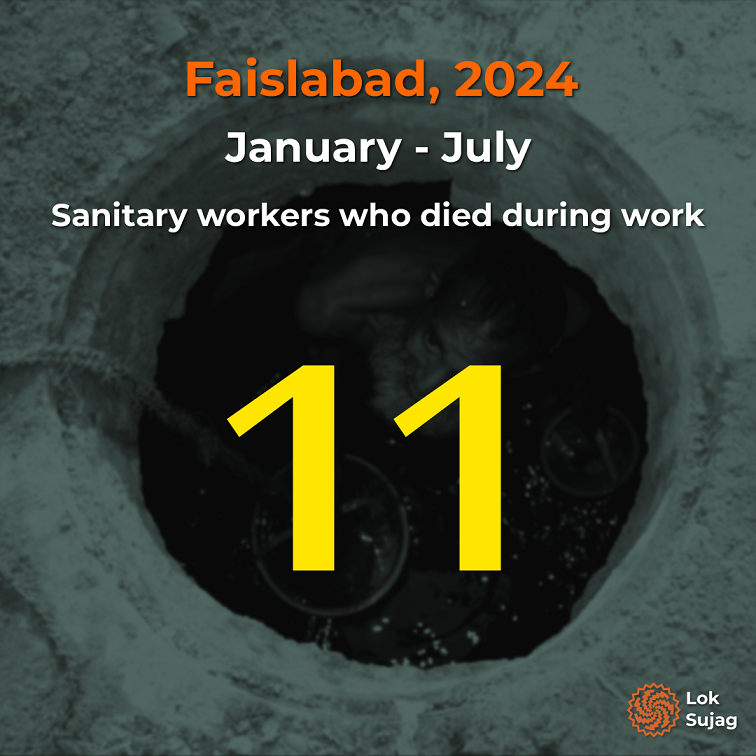
He says that out of about 2,000 sanitation workers required in Wasa Faisalabad, only 730 are working out of which 180 have recently been recruited on daily wages.
The union’s president says the sanitation workers are exposed to respiratory and skin diseases as well as poisonous gases while working in unsafe conditions. Moreover, they are also at risk of being injured by glass, sharp objects or bitten by poisonous insects.
“The health of the workers’ families is also unsafe, but they do not have adequate facilities for vaccination, free medical treatment. We have to go from pillar to post in government offices for the dues of the sanitation worker who dies in any mishap,” laments the union leader.
The Workmen's Compensation Act of 1923 mandates that a worker injured in an accident during work shall be compensated according to law.
“Under Section 12, compensation payment is also mandatory if a worker is employed temporarily or through a contractor.” However, only the regular employees get compensation from Wasa Faisalabad while the support of work charge employees depends on any special grant from the provincial government.
Absence of training programme
A Wasa spokesperson claims that sanitary workers are trained in use of safety equipment and safety measures. According to him, a seminar was also recently held at the Municipal Corporation Hall. However, Mian Maqsood has denied this claim, saying that no training is provided to the ‘sewer men’ at the time of recruitment or during their employment.
“The only thing checked at the time of recruitment is whether the worker is ready to go down the drain or not, which is confirmed by asking him to go down the drain. Nothing further is considered necessary.”
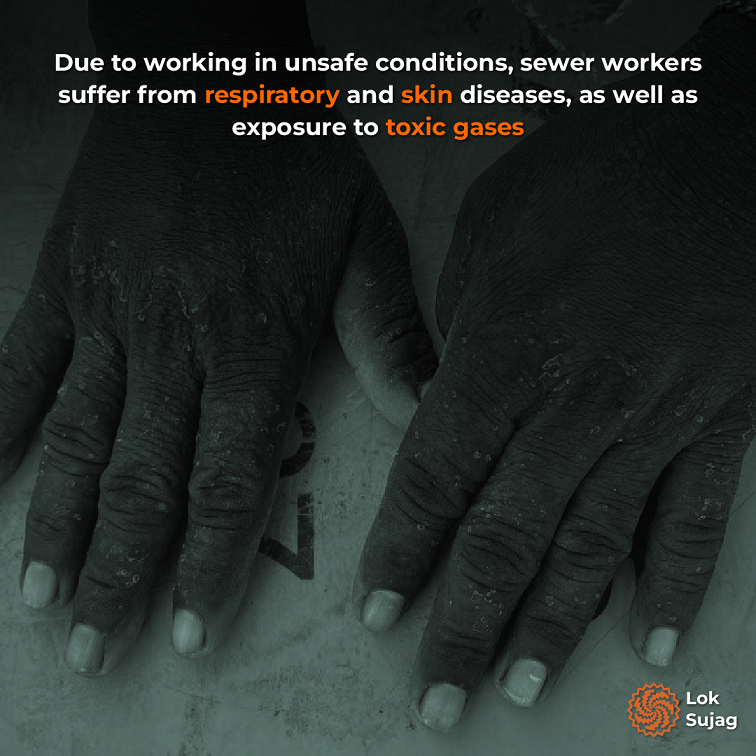
The union leader points out that the tehsils have worse conditions than in Faisalabad where sanitary workers are provided with just a rope as safety equipment. The sewer man ties this rope around his waist and descends into the manhole while officials standing above pull him out in case of an emergency. However, it does not happen every time, he adds.
Two months ago, 42-year-old Shakeel Masih went down the manhole to clean the sewer line of a private residential colony where he died on the spot due to suffocation caused by the poisonous gas. His friend Sohail Masih also died trying to save him.
Missing equipment necessary for work
The Department of Local Government and Community Development Punjab has added 17 pieces of equipment and items to the safety equipment required for sewer men.
This list includes a compressed air line system, single phase portable air compressor, fresh air respirator, fan, multi-body rescue harness, safety belt, multiple gas detectors, tripod, hand winch, head lamp, air blower and exhaust, floodlight with stand, portable generator, dry suit, safety shoes, safety helmet, long shoes, hand gloves and flashlight.
Besides Wasa, Metropolitan Corporation, Faisalabad has seven municipal committees, five tehsil councils and five town committees. The staff of these institutions confirms lack of safety equipment available as per the department’s list.
Metropolitan Corporation chief officer Zafar Wattoo informs Lok Sujag that Wasa is responsible for cleaning sewer lines that’s why there are no sanitation workers in the corporation.
“However, standard operating procedures (SOPs) are followed in the corporation during the maintenance and cleaning of sewerage,” he claims.
On the other hand, the metropolitan corporation’s field staff reveals a different story. According to them, except for issuing a notification, the corporation did not take any action after five people were killed while cleaning sewerage in Dijkot on June 13.
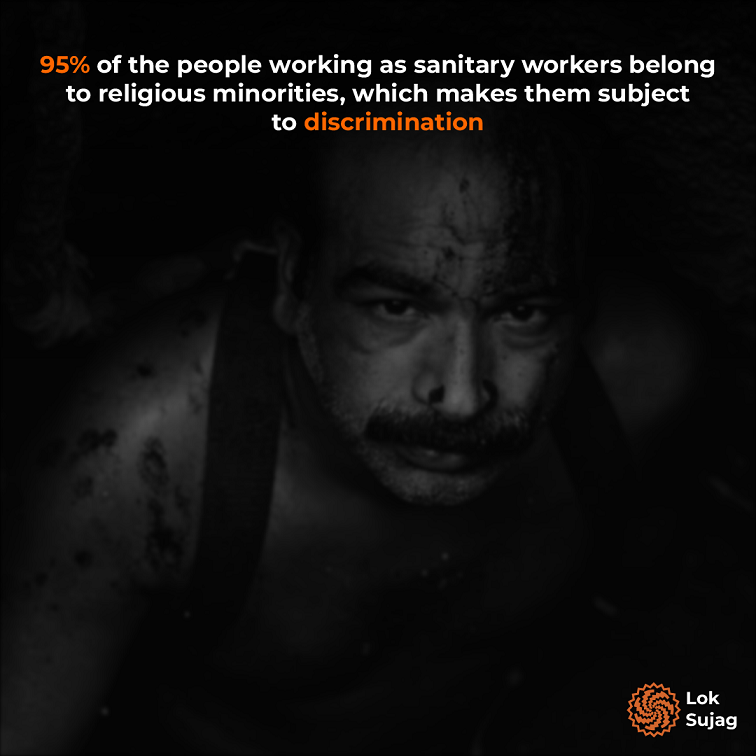
This is also confirmed by the SOP notification issued by the chief officer of the metropolitan corporation, dated June 14. Before this incident, there were no regulations or guidelines in this regard in the corporation.
Violation of human and labour rights
Naeem Sadiq, a member of the Citizens Commission for Equality and Human Rights, says that 95pc of the people working as sanitary workers belong to religious minorities, due to which they are subjected to discrimination.
He stresses that manual cleaning of sewers should be completely banned and should be replaced by locally developed suction, jetting and grabbing machines.
“In case manual cleaning of the line is necessary, the sewer men should be provided with a full body suit, rubber boots, gloves, safety goggles, helmets, full body harness and a ventilation blower for fresh air. Before descending into the sewer, the oxygen level in the sewer or drain should be measured and the absence of toxic gases must be ensured. The head of the institution concerned should be held directly accountable for the death of a worker in a sewer line.”
He called it mandatory to deliver refresher courses to sanitation workers every six months along with formal training on health and safety measures.
In its recent report, the Human Rights Commission of Pakistan (HRCP) has also demanded regularisation of sanitation workers job, end to daily-wage system and halt of manual cleaning of sewers.
The HRCP has also emphasized that regardless of whether sanitary workers are permanent or part-time employees, their heirs should be entitled to compensation in case of an accident.
The report proposes a policy framework under which all employers who directly employ or hire 10 or more sanitation workers through contractors will be required to provide insurance for workers against natural death, disability, accidental death and injury while on the job.
Also Read
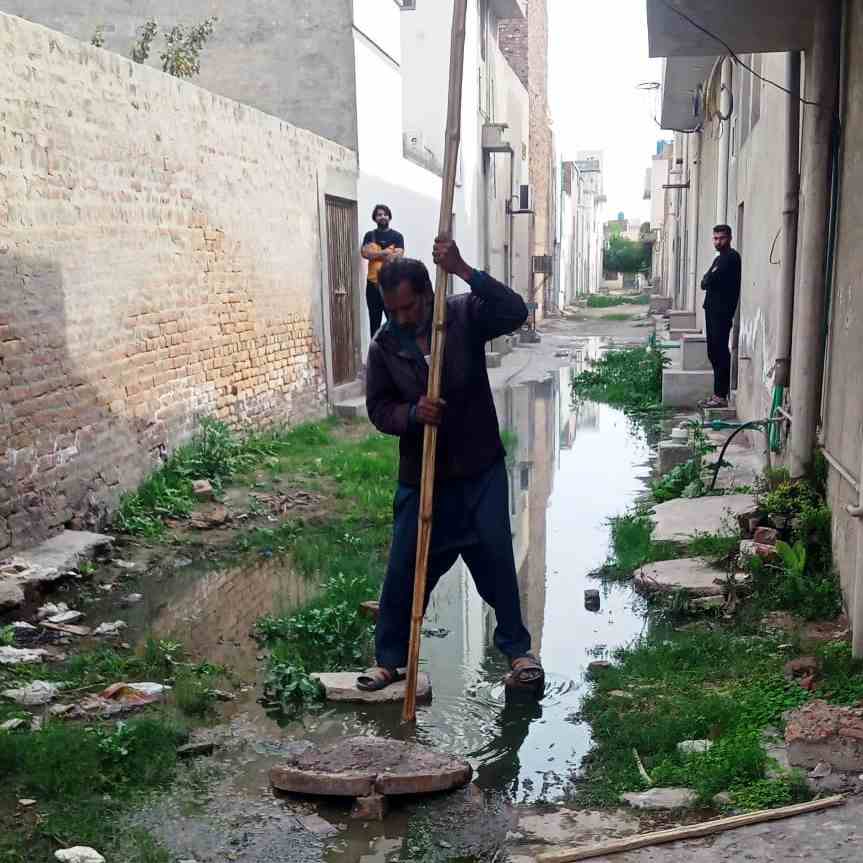
Stigma and sacrifice: A sanitation worker’s quiet battle for dignity and education in Karachi
“Whether insured by the institution itself or through an insurance company, it is in all cases responsible for payment of premiums and administration. The amount for which a sewer is to be insured shall not be less than the sum of compensation specified in the Workmen's Compensation Act.”
Example of other countries to follow
It is worth mentioning here that for this purpose, many developed and developing countries worldwide are using machines including our neighbouring India, United Arab Emirates, Turkey and Malaysia. Sanitation workers in these countries do not even have to face social discrimination as it happens in Pakistan.
India banned manual cleaning by going down the drains and sewage lines initially in 1993. The Supreme Court of India also declared manual cleaning of sewers as a violation of international human rights commitments in 2014. In India, employment as manual cleaners of sewers or latrines was banned in 2013 and the Rehabilitation of Persons with Disabilities Act (PEMSR) was passed to ensure rehabilitation measures for their families.
Articles 37 and 38 of the Constitution of Pakistan emphasize ensuring welfare of its citizens, especially the poor whereas the National Social Security Strategy (2007) also aims at improving the conditions of such sections. However, the country has not yet introduced any social security scheme to specifically ensure the protection of sanitation workers.
Published on 29 Aug 2024
